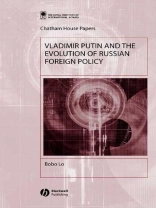Almost three years after the first voluntary handover of power in
Russian history, this book examines Putin’s management of this
complex agenda, and considers how Moscow’s current approach to
international relations resembles and differs from that under
Yeltsin.
* * Examines Putin’s management of Russia’s foreign policy two
years after the first voluntary handover of power in Russian
history.
* Considers how Moscow’s current approach to international
relations resembles and differs from that under Yeltsin.
* Analyses whether changes in foreign policy have been
qualitative, or largely cosmetic.
* Explores growing talk of a ‘strategic
partnership&apos’ with the US and the West.
* Assesses the realism of such hopes and considers whether we are
indeed witnessing a strategic shift in the mentality and conduct of
such Russian foreign policy.
Tabela de Conteúdo
Acknowledgments vii
About the author ix
1 The Putin phenomenon 1
2 The inheritance 9
Identity and self-perception 11
The political context 18
The institutional context 21
The foreign policy panorama 23
Conclusion 29
3 The policy-making environment 31
A cast of thousands? 32
The primacy of the individual and the making (and breaking) of policy 42
All together now? 46
Conclusion 49
4 The economic agenda 51
The ‘unaturalness’ of economics 51
Foreign policy and economic reform 53
The integration agenda and globalization 57
The profit motive 61
Geoeconomics and geopolitics 65
Economization and a ‘balanced’ foreign policy 69
5 Security and geopolitics 72
The geopolitical mindset 72
Change and continuity in Russian strategic thinking 74
The evolution of threat perceptions 83
The future of security and geopolitics – from anachronism to rebirth? 94
6 Identity, values and civilization 97
The burden of the past 98
Integration with the West 101
Identification with the West and the evolution of the
Russian world-view 109
Conclusion 113
7 11 September and after 115
Policy-making – image and reality 117
The economic agenda – Westernization with qualifications 121
A new conception of security? 123
The repackaging of identity 127
Strategic opportunism 129
Towards a sustainable foreign policy 130
Notes 133
Index 161
Sobre o autor
Bobo Lo is an Associate Fellow at the Royal Institute of International Affairs at Chatham House, and the Visiting Fellow at the Carnegie Moscow Center. He has written extensively on Russian foreign and security policy as an independent researcher and, previously, as First Secretary and then Deputy Head of Mission at the Australian Embassy in Moscow (1995-99).












